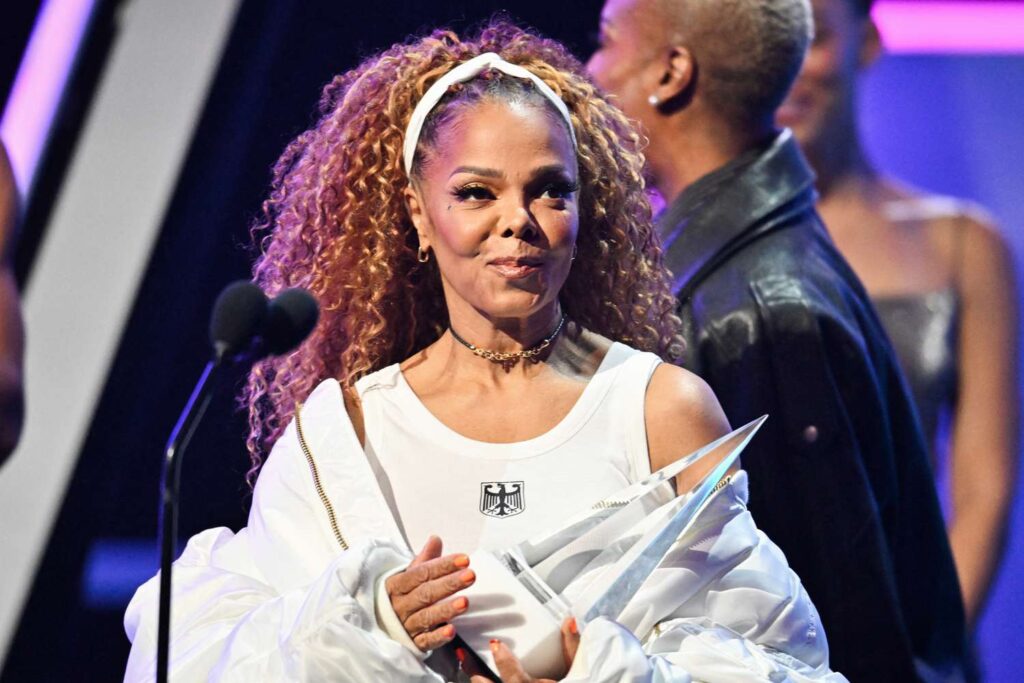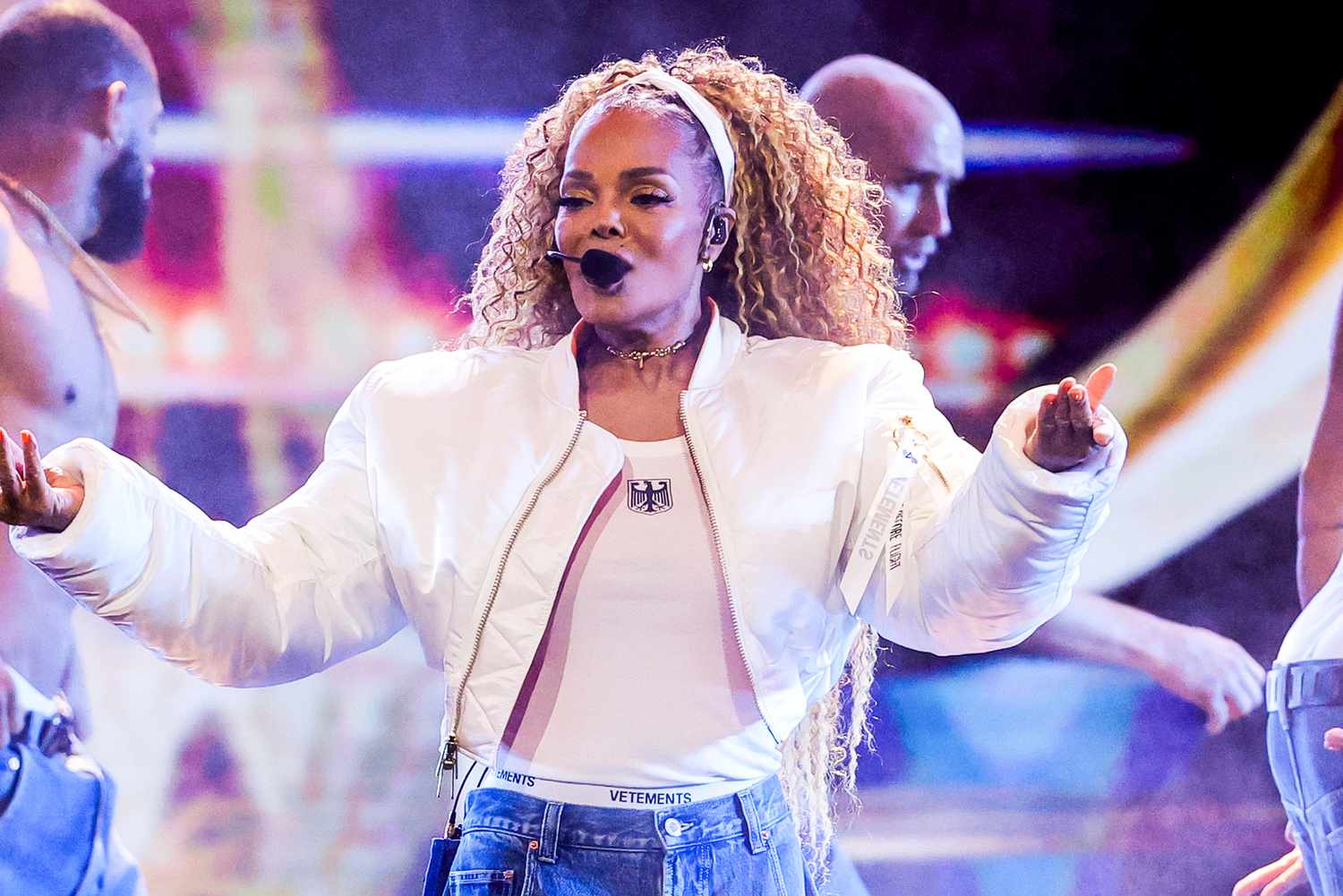In a moment that felt both historic and overdue, Janet Jackson stepped onto the stage at the 2025 American Music Awards, not just to accept one of the highest honors in music—the coveted ICON Award—but to remind the world why she has remained a singular force in the industry for over four decades.
Held at the newly minted Fontainebleau Las Vegas and broadcast live on CBS and Paramount+, the ceremony pulsed with excitement. But when Janet’s name was called, time seemed to pause. Dressed in a custom Vetements denim ensemble and framed by a live band and dancers, she wasn’t just receiving an award—she was reclaiming the throne she never truly left.
Before even taking the mic to accept her award, Janet Jackson gave the audience exactly what they had come for: a dazzling medley of her early 2000s hits, “Someone to Call My Lover” and “All for You.” The performance was electric, yet effortless—a reminder that age has nothing on artistry. Her signature blend of sultry vocals and crisp choreography, all under the direction of a live band, transported the room (and the millions watching at home) back to a time when Janet’s sound ruled the airwaves and her videos redefined pop visuals.
It was more than nostalgia—it was mastery. She commanded the stage with the same ease and intention that has always set her apart, from her Control-era power moves to her Rhythm Nation activism. This wasn’t just about singing a few old songs. It was a declaration: “I’m still here. I’ve always been here. And I’m not going anywhere.”
When actress and director Tasha Smith walked out to present the ICON Award, the crowd roared. But it was Janet’s acceptance speech that truly brought the house down—not with dramatics, but with humility.
“I don’t consider myself an icon,” she said, her voice calm, her eyes soft. “That was never the goal.”
And there it was—classic Janet. Even while receiving a lifetime achievement award, she redirected the spotlight toward her family, her team, and the fans who’ve supported her through triumphs, transformations, and tabloid storms. She spoke with grace about the Jackson legacy—not just the fame and notoriety, but the deep-rooted love for music that she inherited and then reshaped in her own image.
Janet’s message was clear: she got here through discipline, sacrifice, and heart—not ego. “We didn’t chase fame,” she said. “We chased sound. We chased story.”
For a generation used to artists who scream for attention on social media, Janet’s poise felt almost revolutionary.

To understand why this moment mattered so much, you have to understand the scale of Janet Jackson’s impact.
She wasn’t just a little sister in the most famous music family in history. She became a powerhouse in her own right—a cultural chameleon who consistently pushed music, fashion, and societal boundaries. From the revolutionary politics of Rhythm Nation 1814 to the sensual liberation of The Velvet Rope, Janet didn’t just evolve with the times—she often set the agenda.
She’s sold more than 140 million records worldwide. She’s earned five Grammy Awards, eleven AMAs, a star on the Hollywood Walk of Fame, and even her own induction into the Rock & Roll Hall of Fame. But numbers alone don’t define her.
Janet’s artistry is tactile. Her music videos—featuring futuristic choreography, bold aesthetics, and intimate storytelling—redefined the visual landscape of pop. Her collaborations with producers like Jimmy Jam and Terry Lewis helped build an entirely new sonic blueprint for R&B and pop. And her presence gave young Black women a blueprint for power, softness, and control—pun fully intended.
In recent years, Janet Jackson has kept a relatively low profile compared to her earlier decades of dominance. While she’s never truly left the music scene, her public appearances have been carefully curated, often aligning with major projects like her documentary or brief tours.
That’s why her appearance at the 2025 AMAs felt like such a big deal. It wasn’t just a performance—it was a reintroduction.
And it came with perfect timing. Just days before the AMAs, Janet resumed her sold-out Las Vegas residency titled JANET JACKSON: LAS VEGAS, a six-show experience running from May 21 to May 31. It offered fans a deep-dive into her catalog and served as both a celebration and a continuation of her story.
For those who’ve been longing for the magic of the old MTV era, where music was theater and pop stars were larger-than-life, Janet’s return was a breath of fresh air. She reminded us that reinvention doesn’t have to be loud or controversial. It can be elegant. It can be earned.
The AMAs’ ICON Award isn’t just another trophy—it’s a recognition reserved for those who’ve fundamentally reshaped the music landscape. Past recipients include Lionel Richie and Rihanna, artists who’ve turned cultural tides and carved out new territory. Adding Janet to this list doesn’t just feel right—it feels essential.
After all, Janet Jackson was an icon before awards shows even had a title for it. She was the first Black female artist to win MTV’s Video Vanguard Award. She was one of the earliest pop stars to turn concerts into full-blown theatrical productions. She faced censorship, criticism, and controversy—most notably after the 2004 Super Bowl performance—and still managed to preserve her legacy with dignity.
In a culture obsessed with who’s trending, the ICON Award is a reminder of who truly endures. And Janet Jackson? She’s been trending across five decades without having to chase it.
Every artist who’s come after Janet—especially women in pop and R&B—owes her a creative debt. From Beyoncé to Britney, Ciara to Normani, echoes of Janet’s style, sound, and movement reverberate across their work.

Her influence is visible in choreography-heavy performances, fashion-forward visuals, and the blending of vulnerability with power. Artists like Rihanna have openly cited her as an inspiration. Even in today’s TikTok-driven music ecosystem, you can trace the DNA of Janet’s visual storytelling in short-form dance challenges and cinematic music drops.
What’s more powerful than a hit song? A movement. And Janet has sparked several.
For fans—many of whom have followed her since the Good Times and Control era—this AMA tribute was more than just an awards show highlight. It was a full-circle moment. The same woman they watched grow from a teenage TV actress to a genre-shattering global icon is now getting her flowers, live, in front of a new generation.
You could see the emotion in the crowd—especially in the eyes of fans who have raised their kids on Janet’s music. You could feel the gratitude, the nostalgia, and the pride. This wasn’t just a tribute to Janet Jackson—it was a tribute to everything she represents: longevity, Black excellence, feminine strength, and quiet rebellion.
While Janet hasn’t confirmed any new albums or world tours just yet, the buzz following her AMA appearance suggests she’s far from finished. The Vegas residency continues to bring in a multi-generational audience, and industry insiders speculate that this could be the start of a larger project rollout.
One thing is for certain: Janet doesn’t move unless it means something. If she’s stepping back into the spotlight, it’s because she has more to say—and fans are more than ready to listen.
In a music industry that often discards its pioneers in favor of shiny new acts, Janet Jackson’s recognition at the 2025 AMAs was a necessary reminder: greatness doesn’t fade, it matures.
Janet’s story is not just about chart-topping singles or dance moves. It’s about resilience. It’s about evolving while staying rooted in purpose. It’s about lifting others up even when the spotlight is squarely on you.
She didn’t need a comeback. She simply stepped forward.
And in doing so, Janet Jackson didn’t just receive an award—she became the award. A living legend. A masterclass in grace, grit, and groove.
So here’s to Janet—still in control, always iconic, forever Miss Jackson (if you’re nasty).
